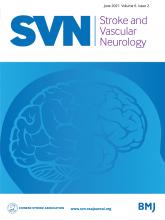Open Access
Remote ischaemic conditioning for stroke: unanswered questions and future directions
Sheharyar Baig, Bethany Moyle, Krishnan Padmakumari Sivaraman Nair, Jessica Redgrave, Arshad Majid, Ali Ali
DOI: 10.1136/svn-2020-000722 Published 28 June 2021
Sheharyar Baig
1
Cerebrovascular Medicine, The University of Sheffield Institute for Translational Neuroscience, Sheffield, UK
Bethany Moyle
1
Cerebrovascular Medicine, The University of Sheffield Institute for Translational Neuroscience, Sheffield, UK
Krishnan Padmakumari Sivaraman Nair
2
Neurosciences, Sheffield Teaching Hospitals NHS Foundation Trust, Sheffield, UK
Jessica Redgrave
1
Cerebrovascular Medicine, The University of Sheffield Institute for Translational Neuroscience, Sheffield, UK
Arshad Majid
3
Faculty of Medicine and Dentistry, University of Sheffield, Sheffield, UK
Ali Ali
4
Geriatrics and Stroke Medicine, Sheffield Teaching Hospitals NHS Foundation Trust, Sheffield, UK
5
Sheffield NIHR Biomedical Research Centre, The University of Sheffield, Sheffield, UK

Submit a Response to This Article
No eLetters have been published for this article.
Remote ischaemic conditioning for stroke: unanswered questions and future directions
Sheharyar Baig, Bethany Moyle, Krishnan Padmakumari Sivaraman Nair, Jessica Redgrave, Arshad Majid, Ali Ali
Stroke and Vascular Neurology Jun 2021, 6 (2) 298-309; DOI: 10.1136/svn-2020-000722





